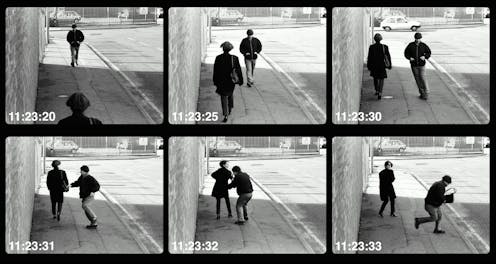Can anyone make a citizen’s arrest? The history and legalities of catching criminals yourself
- Written by Seth W. Stoughton, Professor of Law, University of South Carolina

When can someone make a citizen’s arrest? The rules are a bit different in every state, which can make things confusing. You can ask a librarian to help you find information about the law in your state, but here are some common requirements to get you started:
Who can make a citizen’s arrest? Although some state laws use the word “citizen[14],” most states allow any “person[15]” or any “private person[16]” – as opposed to a public employee such as a police officer – to make a citizen’s arrest. Despite the name, you usually don’t have to be a citizen. And most states don’t require any minimum age, so it looks like high school student Peter Parker, Spider-Man’s alter ego, is good to go.
Did you see it, and how serious is it? Most states allow you to make a citizen’s arrest for a minor crime – those categorized as a misdemeanor[17] – only if you actually saw the person commit the crime. Some states allow a citizen’s arrest for a minor crime only if it is considered a “breach of peace,” meaning the crime is likely to disturb other people, such as fighting in public. For felonies, a more serious category of crime, the law usually allows you to make a citizen’s arrest even if you didn’t see the person commit the crime.
You’d better be sure! In most states, citizen’s arrest laws apply only if the person actually committed a crime. If you make a mistake by making a citizen’s arrest of someone who didn’t actually commit a crime, the person you arrested can sue you[18]. You might even get arrested[19] yourself!
This is different from when police arrest someone. Law enforcement officers need “probable cause[20],” which is the legal standard for how sure you need to be that a person committed a crime before arresting them. As long as an officer meets the probable cause standard, they won’t get in trouble, even if they’re ultimately mistaken about the person committing a crime.
Try not to rough anyone up. Someone making a citizen’s arrest is usually allowed to use a reasonable amount of physical force to ensure that the lawbreaker stops committing the crime and can’t leave. But that doesn’t mean you can do anything you want. The type and amount of force you use must be closely related[21] to whether the other person is trying to get away and, if so, what they’re doing.
Just because you can doesn’t mean you should. Making a citizen’s arrest is no joke. There’s the danger of making a mistake about what the person did and whether it was a crime. After all, most people don’t know exactly what the law allows or prohibits, so it’s easy to get something wrong.
And there’s the danger of getting hurt. Most people aren’t trained or equipped to arrest someone safely, and they rarely have backup available like the police do. If you see a crime occur, it’s better to call the police and be a good witness than it is to try to make a citizen’s arrest yourself.
So, what do you think: Is Spider-Man allowed to make a citizen’s arrest? And if he is, does that make him a hero or a vigilante?
Hello, curious kids! Do you have a question you’d like an expert to answer? Ask an adult to send your question to CuriousKidsUS@theconversation.com[22]. Please tell us your name, age and the city where you live.
And since curiosity has no age limit – adults, let us know what you’re wondering, too. We won’t be able to answer every question, but we will do our best.
References
- ^ Curious Kids (theconversation.com)
- ^ curiouskidsus@theconversation.com (theconversation.com)
- ^ didn’t exist in the United States (time.com)
- ^ the Statute of Winchester (study.sagepub.com)
- ^ countries have adopted similar rules (en.wikipedia.org)
- ^ only white men could make citizen’s arrests (www.fastcompany.com)
- ^ intimidate and terrorize enslaved and free Black communities (www.fastcompany.com)
- ^ through the Civil War (racism.org)
- ^ the Jim Crow era and even into the 1900s (historynewsnetwork.org)
- ^ including lynchings (theconversation.com)
- ^ was shot and killed (theconversation.com)
- ^ laws on the books (www.washingtonpost.com)
- ^ Glasshouse Images/The Image Bank via Getty Images (www.gettyimages.com)
- ^ citizen (www.scstatehouse.gov)
- ^ person (statutes.capitol.texas.gov)
- ^ private person (www.revisor.mn.gov)
- ^ categorized as a misdemeanor (www.britannica.com)
- ^ person you arrested can sue you (www.findlaw.com)
- ^ arrested (www.law.cornell.edu)
- ^ probable cause (www.law.cornell.edu)
- ^ closely related (nyupress.org)
- ^ CuriousKidsUS@theconversation.com (theconversation.com)
Authors: Seth W. Stoughton, Professor of Law, University of South Carolina

